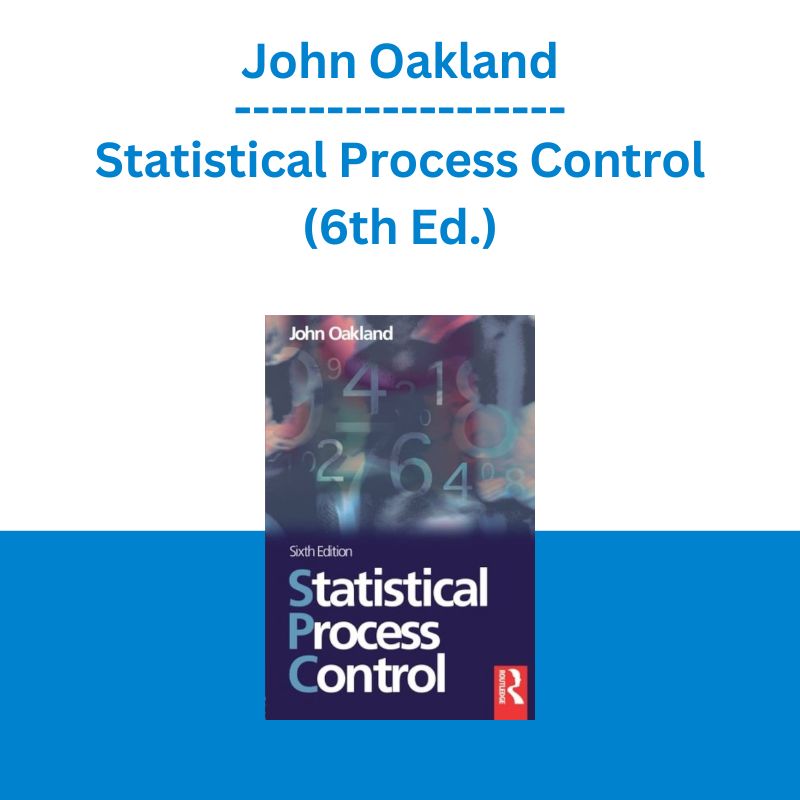*** Proof of Product ***
Exploring the Essential Features of “John Oakland – Statistical Process Control (6th Ed.)”
Statistical Process Control (SPC) is a tool that measures and achieves quality control, providing managers from a wide range of industries with the ability to take appropriate actions for business success. Offering a complete instructional guide to SPC for professional quality managers and students alike, all the latest tools, techniques and philosophies behind process management and improvement are supported by the author’s extensive consulting work with thousands of organisations worldwide. Fully updated to include real-life case studies, new research based on actual client work from an array of industries, a new chapter on process capability, and integration with the latest computer methods and Minitab software, the book also retains its valued textbook quality through clear learning objectives and end of chapter discussion questions. It will serve as a textbook for both student and practicing engineers, scientists, technologists and managers and for anyone wishing to understand or implement modern statistical process control techniques.
· The complete instructional guide to SPC, with links to Six Sigma/Lean approaches, helping managers to communicate the philosophy of process management and improvement as a key to business success
· Written by a leading guru on total quality management, this fully modernised new edition includes real-life case studies, new research based on actual client work from an array of industries, and a new chapter on process capability
· An ideal textbook with clear learning objectives and end of chapter discussion questions, a non-mathematical and practical style, along with the integration of the latest computer methods and Minitab software
Editorial Reviews
Review
Reviews of previous editions:
‘I was particularly impressed by the ease with which a reader could use it for implementing SPC. It should be in the library of all organisations and on the bookcase of all individuals involved in process design, evaluation, control and continuous improvement of performance, products or services.’
June 2005 edition of “Significance – statistics making sense”, a publication of the Royal Statistical Society
‘This new edition has been restructured to reflect the latest thinking in the field, giving the foundations of good quality management and process control. The book remains a solid and reliable reference to SPC.’
QUALITY WORLD
‘…outlines all the techniques of SPC in a non-mathematical, practical way… useful in every industrial situation.’
BSI NEWS
‘…if you want to know about and/or implement SPC you will gain much practical information and help from this book.’
QUALITY NEWS
‘Whether your sector is manufacturing, sales, marketing, finance, service, or public, this instructional guide to the tools of SPC is an essential practical guide.’ – QUALITY WORLD, FEB 2003
Great for the newcomer to SPC in industry or management, 4 April, 2001
Reviewer: ([email protected]) from Ayrshire, Scotland
As a statistician working in industry I am constantly looking for books that can get the message of SPC across to a mixed audience of analysts, engineers and managers.
This book does just that in simple language, minimising the use of formulae and mathematical proofs with the added advantage of using examples that the reader can relate to. No prior knowledge of statistics is required to understand and apply the enclosed information.
Reviewer: Paul Smith ([email protected]) from North West England, May 14, 2003
A really great book. Easy to read and understand, while catering for those new to SPC and the more experienced.
From the Back Cover
‘Whether your sector is manufacturing, sales, marketing, finance, service, or public, this instructional guide to the tools of SPC is an essential practical guide.’ – Quality World, Previous Edition Review
Statistical Process Control (SPC) is a tool that measures and achieves quality control, providing managers from a wide range of industries with the ability to take appropriate actions for business success. Ever greater interest in the role of SPC, and in related approaches such as Six Sigma, has led to the revision of this authoritative text to include new research, expanded case-study material and real-life examples from a number of industries, all supported by the author’s extensive consulting work with thousands of organisations across the globe. John Oakland offers a complete instructional guide to SPC for professional quality managers and students alike, which presents in a practical, non-mathematical way all the latest tools, techniques and philosophies behind process management and improvement.
. The complete instructional guide to SPC, with links to Lean/Six Sigma approaches, helping managers to communicate the philosophy of process management and improvement as a key to business success
. Written by a leading guru on quality management, this fully modernised new edition includes real-life case studies, new research based on actual client work from an array of industries, and a new chapter on process capability
. An ideal textbook with clear learning objectives and end of chapter discussion questions, a non-mathematical and practical style, along with the integration of the latest computer methods and Minitab software
Providing the foundations of good quality management, this book offers clear guidance and all the necessary theory and techniques of modern statistical process control to fully understand how to manage processes for success.
John Oakland is the Executive Chairman of Oakland Consulting plc and Professor of Business Excellence and Quality Management at Leeds University Business School, UK. His work on helping organisations to improve performance has been published widely.
Product details
Publisher : Butterworth-Heinemann; 6th edition (November 9, 2007)
Language : English
Top reviews from the United States
Mohammadreza Andarz
5.0 out of 5 stars great
This book really helped me, and met all of my requirements.I really suggest this book to my friends. Many thanks to author of the book.
Top reviews from other countries
a customer
5.0 out of 5 stars Beware, no Lean
I have just received this book and it looks good – so I’m not reviewing the contents, just want to point out that if your read the above synopsis it makes a reference to “Six Sigma/Lean” – there is no Lean in the index or chapter headings – there is a chapter on Six Sigma which is quite different from Lean.
Mr. John P. Wood
5.0 out of 5 stars Five Stars
Great read a good refresher from my college days
Please see the full list of alternative group-buy courses available here: https://lunacourse.com/shop/










 Morgan Gist MacDonald - Book + Bonuses
Morgan Gist MacDonald - Book + Bonuses  Matthew Kratter - Trader University
Matthew Kratter - Trader University  Alphashark - The AlphaShark SV-Scalper
Alphashark - The AlphaShark SV-Scalper  Morgan Gist MacDonald - Start Writing Your Book Today
Morgan Gist MacDonald - Start Writing Your Book Today  Morgan Gist MacDonald - The Complete Book-Writing Checklist
Morgan Gist MacDonald - The Complete Book-Writing Checklist  Derald Wing Sue - Multicultural Competence in Counseling & Psychotherapy
Derald Wing Sue - Multicultural Competence in Counseling & Psychotherapy  Morgan Gist MacDonald - Think Like a Professional Author
Morgan Gist MacDonald - Think Like a Professional Author  Ed Ponsi - Forex Trading
Ed Ponsi - Forex Trading  Jesse Livermore Trading System - Joe Marwood
Jesse Livermore Trading System - Joe Marwood  Hannah Dixon - The VA Starter Kit™
Hannah Dixon - The VA Starter Kit™  Sovereign Man Confidential - Renunciation Video
Sovereign Man Confidential - Renunciation Video  The Daily Traders – Exclusive Trading Mentorship Group
The Daily Traders – Exclusive Trading Mentorship Group  Racing Workshop - Complete Online Package
Racing Workshop - Complete Online Package  Combat Core - Advanced Torso Training - Chris Fanelli
Combat Core - Advanced Torso Training - Chris Fanelli